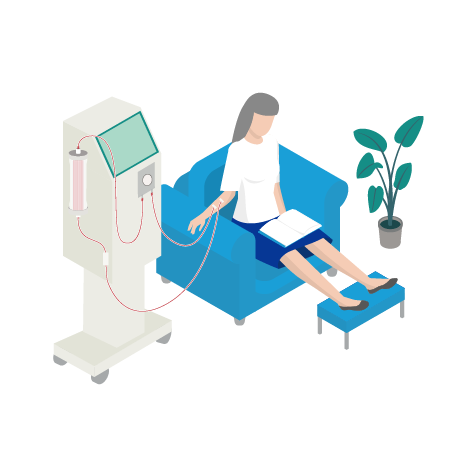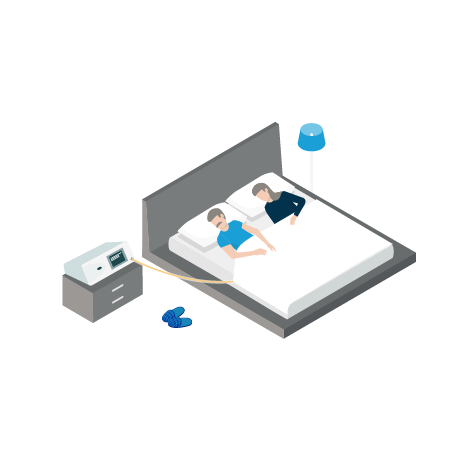Dialysis
Dialysis is a term that you undoubtedly hear whenever the topic of end-stage kidney disease or kidney failure arises. But what does it entail and why is it a treatment for chronic kidney disease (CKD)? Though the answers are anything but straightforward, this article aims to provide you with a simplified introduction to dialysis.
What is dialysis?
Dialysis is a medical process that removes toxins and waste from the body and helps maintain its fluid balance by filtering blood across a membrane, which mimics a healthy kidney. It is generally the most common treatment option for end-stage kidney failure.
Dialysis is typically recommended when you have symptoms that indicate end-stage kidney disease. This stage is also called end-stage kidney failure where kidney function declines so much that toxins start building up to high levels and fluid balance becomes a problem, especially fluid overload. In this scenario, dialysis can reduce symptoms and prevent a potentially fatal buildup of toxins and fluid in the body.

Types of dialysis
There are two main types of dialysis: Hemodialysis (HD) and Peritoneal Dialysis (PD).
In HD, the blood is run through a dialyzer, often referred to as an artificial kidney, and returned to the body in a continuous process. The process usually takes around 3-5 hours and can be done at a dialysis center or at home. It is typically performed at least 3 times per week.

In PD, the blood is cleaned inside the body using the natural lining of your abdomen (peritoneal membrane) as a filter and a special sterile dialysis fluid which is run into and out of your abdomen. PD is done at home and typically performed daily, either manually during the day in 3-4 short sessions or automatically using a machine (cycler) for the entire night.
Choosing the type of dialysis
When choosing the type of dialysis, it is important to consider multiple factors such as your living situation, lifestyle, and pre-existing health conditions. The decision will be taken together by you and your healthcare team who will explain the options suited to you. The selected treatment type can be re-evaluated and changed later, if required.
Alternative to dialysis
Though dialysis is the most common treatment for kidney failure, there are alternatives that can be explored based on your individual situation.
The ideal scenario for many people is a kidney transplant, where you receive a healthy kidney from a donor. This usually removes the need for dialysis and can signal a return to largely normal life, possibly with certain limitations, including daily medication to prevent rejection of the donor kidney. There are many considerations associated with this treatment option, including your overall health. If you are an ideal candidate for a transplant, your healthcare team will discuss the details with you.
An alternative is to opt for conservative care in which your symptoms are controlled with medication and the focus is on your comfort and quality of life. It is important to note that this approach is not a treatment and cannot replace kidney function or stop the progression of CKD in any way. This form of care should only be considered if you and your healthcare team think that dialysis or kidney transplant are not suitable options for you.
Before starting dialysis
Before you start dialysis, be it PD or HD, a surgical procedure called dialysis access surgery is performed. This procedure creates an access to the blood stream for HD or to the peritoneal cavity for PD.
Your healthcare team will provide you with all the necessary information that you need to know prior to and during dialysis treatment. At this stage, it is important to address all potential concerns and questions you might have.

Preparing for your first dialysis session
Apart from the steps your healthcare team will take to prepare your body for treatment, it is vital that you prepare yourself mentally. Talk to your family and friends so that you have a support network, if required. Plan your daily schedule in such a way that you set aside enough time for treatment. This time required may vary based on the type of dialysis. If you are undergoing HD, consider whether you want to plan some relaxing activities for the treatment duration – load up your playlist or keep a favorite book handy.
Regardless of dialysis type, remember that the change in routine will take getting used to and that keeping a positive outlook is essential.
Life expectancy on dialysis
Life expectancy on dialysis depends on many factors, including any other long-term conditions that you may have, whether you can undergo a kidney transplant, and how efficient dialysis is for you.
Talk to your healthcare team to understand your specific condition. It is also important that you keep to your treatment plan and dialysis schedule as well as follow the advice of your healthcare team.